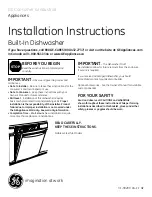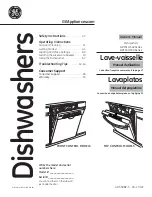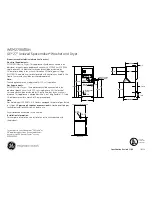
- 17 -
Rinse conditioner dispenser 1
Use of a rinse conditioner will result in cleaner and faster
drying of the load, since it helps water and soil to run off.
Too much conditioner may result in streakiness, too little
may cause white spots. The dispenser holds about 140 ml.
This is enough for 40-70 wash cycles, depending on the
dosage setting. When the rinse conditioner level is appro-
aching the bottom of the scale it is time to refill the dispenser.
Adjust the dosage setting according to the hard-
ness if the water. Begin with the lowest dosage
setting and increase as necessary by turning the
arrow clockwise.
1. Swivel out the filler trough.
2. Fill up with rinse conditioner until the level reaches
up to the red mark on the level indicator tube; do
not overfill.
3. Wipe off any spillage carefully to prevent excessive
foaming during the next wash programme.
4. Close the filler trough afterwards.
Do not fill the rinse conditioner dispenser
with liquid detergent.
Spray arm 2
It is important to keep all the holes in the spray arm clear.
A clogged hole can seriously affect washing efficiency. If
the spray arm needs cleaning, unscrew the nut clockwise
(left-hand thread) and lift off the spray arm. Clear the holes
and shake out any food remnants.
Coarse filter 3
The purpose of the coarse filter is to catch large objects
such as toothpicks and pieces of eggshell. Make sure that
the filter is always clean. Lift it out and rinse it under run-
ning water whenever necessary.
Fine filter 4
It is just as important to keep this filter clean. A dirty or
clogged filter will always impair washing efficiency. The
fine filter can easily be lifted out for cleaning when you
have removed the coarse filter.
Detergent dispenser 5
Consult the instructions on the detergent packet and fill
the compartment with the detergent. Remember that the
instructions usually refer to full-size dishwashers, for example
when using detergent tablets, it is sufficient to use just half
a tablet.
Only use detergents specially designed for
dishwashers.
Water softener 6
This dishwasher is equipped with a water softener for hard
water, therefore shall the rinse aid dispenser be set for a
low dosage. The lime in hard water causes white deposits
to occur on dishes and to the interior of the dishwasher.
To prevent this, the water has to pass through a special
container where the hardness is removed.
Since the water softener uses coarse dishwasher salt,
you will have to refill the salt container after a certain
number of dishwashing cycles.
It is important to fill the compartment with
coarse dishwasher salt before using the
machine for the first time, if you live in an
area where the water is calciferous.
The indicator light on the control panel is lit when the
container requires refilling.
1. Unscrew the filler cap to the salt container anti-
clockwise.
2. Fill the salt container with water (only the first
time).
3. Fill the container with coarse salt, using the
funnel supplied.
4. Remove the funnel and wipe off any spillage
around the filler opening.
5. Screw the filler cap back properly in place.
The water softener is now ready for the first load of dishes.
Always make sure that there is coarse grained salt in the
container, which holds about 1 litre, which is enough for
about 20 - 30 dishwashing cycles.
Use only special salt for dishwashing machines,
ordinary domestic salt can damage the water
softener.
Water softener plug 7
As supplied from the factory, the water softener is set for
a water hardness of up to 20°dH. If your water is harder
than this, you can increase the capacity of the water sof-
tener by pulling out the ruber plug at the rear of the dish-
washer on the right.
Description of the appliance































